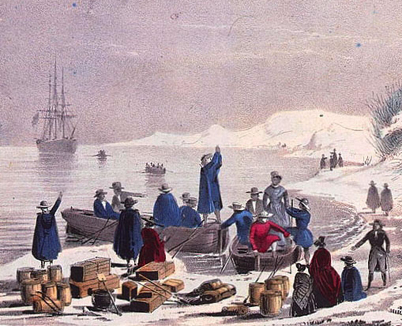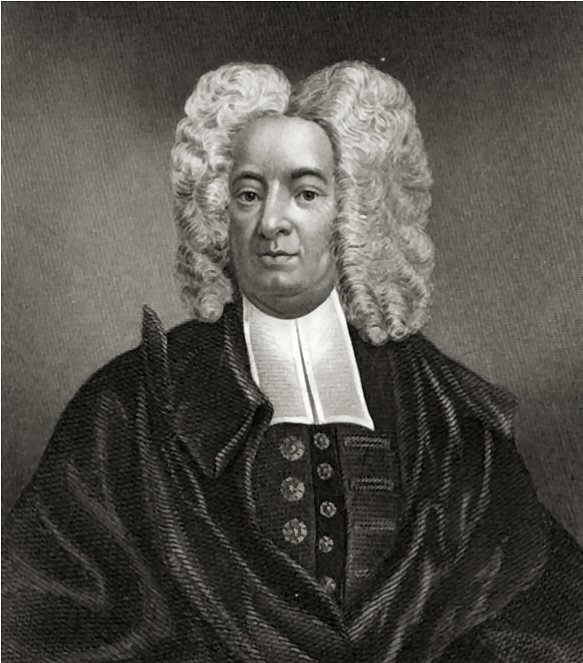Early Settlement Destinations of the New World:

The Puritan Way of Life

A Summary of Puritans in New England: Most of the Puritans settled in the New England area. As they immigrated and formed individual colonies, their numbers rose from 17,800 in 1640 to 106,000 in 1700. Religious exclusiveness was the foremost principle of their society. The spiritual beliefs that they held were strong. This strength held over to include community laws and customs. Since God was at the forefront of their minds, He was to motivate all of their actions. This premise worked both for them and against them. Their interpretation of scriptures was a harsh one. Actions spoke louder than words, so actions had to be constantly controlled.
The doctrine of predestination kept all Puritans constantly working to do good in this life to be chosen for the next eternal one. God had already chosen who would be in heaven or hell, and each believer had no way of knowing which group they were in. Those who were wealthy were obviously blessed by God and were in good standing with Him. The Protestant work ethic was the belief that hard work was an honor to God which would lead to a prosperous reward. Any deviations from the normal way of Puritan life met with strict disapproval and discipline. Since the church elders were also political leaders, any church infraction was also a social one. There was no margin for error.
The devil was behind every evil deed. Constant watch needed to be kept in order to stay away from his clutches. Words of hell fire and brimstone flowed from the mouths of eloquent ministers as they warned of the persuasiveness of the devil’s power. The sermons of Jonathan Edwards, a Puritan minister, show that delivery of these sermons became an art form. They were elegant, well formed, exegetical renditions of scriptures… with a healthy dose of fear woven throughout the fabric of the literary construction. Grammar children were quizzed on the material at school and at home. This constant subjection of the probability of an unseen danger led to a scandal of epidemic proportions.
Great pains were taken to warn their members and especially their children of the dangers of the world. Religiously motivated, they were exceptional in their time for their interest in the education of their children. Reading of the Bible was necessary to living a pious life. The education of the next generation was important to further “purify” the church and perfect social living.
Jonathan Edwards- a Philosophical Theologian
Jonathan Edwards was a Puritan minister. Edwards is widely regarded as “one of America’s most important and original philosophical theologians”. His interpretation of his religion is commonly considered the doctrine for Puritans in the new world. Following a spectacular earthquake in New England in 1727, Edwards presented a sermon in which he declared: If a nation or people are very corrupt and remain obstinate in the Evil way God generally if not universally exercises these threatenings God is more strict in punishing of a wicked people in this world than a wicked person. God often suffers particular persons that are wicked to prosper in the world and discharges them to judgment in the world to come. But a people as a people are punished only in this world. Therefore God will not suffer a people that grow very corrupt and refuse to be reclaimed to go unpunished in this world.
Being sensible that I am unable to do anything without God’s help, I do humbly entreat him by his grace to enable me to keep these resolutions so far as they are agreeable to his will, for Christ’s sake.

REMEMBER TO READ OVER THESE RESOLUTIONS ONCE A WEEK.
Resolved, never to DO, BE, or SUFFER anything in soul or body, less or more, but what tends to the glory of God.
Resolved, never to lose one moment of time, but improve it in the most profitable way I possibly can.
Resolved, to live with all my might while I do live.
Resolved, never to do anything which I should be afraid to do if it were the last hour of my life.
Resolved, to think much, on all occasions, of my own dying and of the common circumstances which attend death.
Resolved, to be endeavoring to find out fit objects of charity and liberality.
Resolved, never to do anything out of revenge.
Resolved, never to suffer the least motions of anger to irrational beings.
Resolved, never to speak evil of any person except some particular good call for it.
Resolved, to maintain the strictest temperance in eating and drinking.
Resolved, never to do anything which if I should see in another, I should count a just occasion to despise him for or to think any way the more meanly of him.
Resolved, to study the Scriptures so steadily, constantly, and frequently as that I may find and plainly perceive myself to grow in the knowledge of the same.
Resolved, never to speak anything that is ridiculous, sportive, or matter of laughter on the Lord’s day.
Whenever I hear anything spoken in conversation of any person, if I think it would be praiseworthy in me, resolved to endeavor to imitate it.
Resolved, after afflictions, to inquire what I am the better for them; what good I have got, and what I might have got by them.
Puritan ideals claimed that pleasure was to be had in the afterlife, and that to achieve access to heaven and its wonders, people were not to take any pleasure from their mortal existence. Puritan society believed that the duty of man was only to glorify God. Participating in activities such as gambling, bear baiting, any activity involving unseemly public frivolity and attending theatrical performances was illegal in most Puritan-influenced areas.
Puritans believed the human body and condition to be unclean, unholy and depraved. No pleasure was to be taken from sexual relations. Sex was merely a means of reproducing. Spouses displaying affection toward one another was considered lewd and unseemly. It is recorded that a Captain Kimble, after returning home from a three-year military tour, kissed his wife on the doorstep of their home and was promptly placed in the stocks for two hours as punishment. “Fornication,” which meant intimate relations between unmarried people was heavily condemned, with a range of punishments from a large fine to a public whipping for both parties, or even execution for repeat offenders. Adultery was also punishable by death in many Puritan communities, although in more moderate areas, the punishment for adultery involved public humiliation via a public whipping and being forced to wear a large, scarlet letter “A,” so that everyone was aware of the offense.
Attendance at church on Sunday was mandatory, and anyone not in attendance risked a fine or, for repeat offenses, time in the stocks or a public whipping. Citizens were not permitted to express negative opinions or to question anything relating to the Bible.
Puritans believed in witchcraft and believed that witches lived among them and worked against God for Satan. In both England and America, the Puritans were responsible for imprisoning and executing large numbers of “witches.
